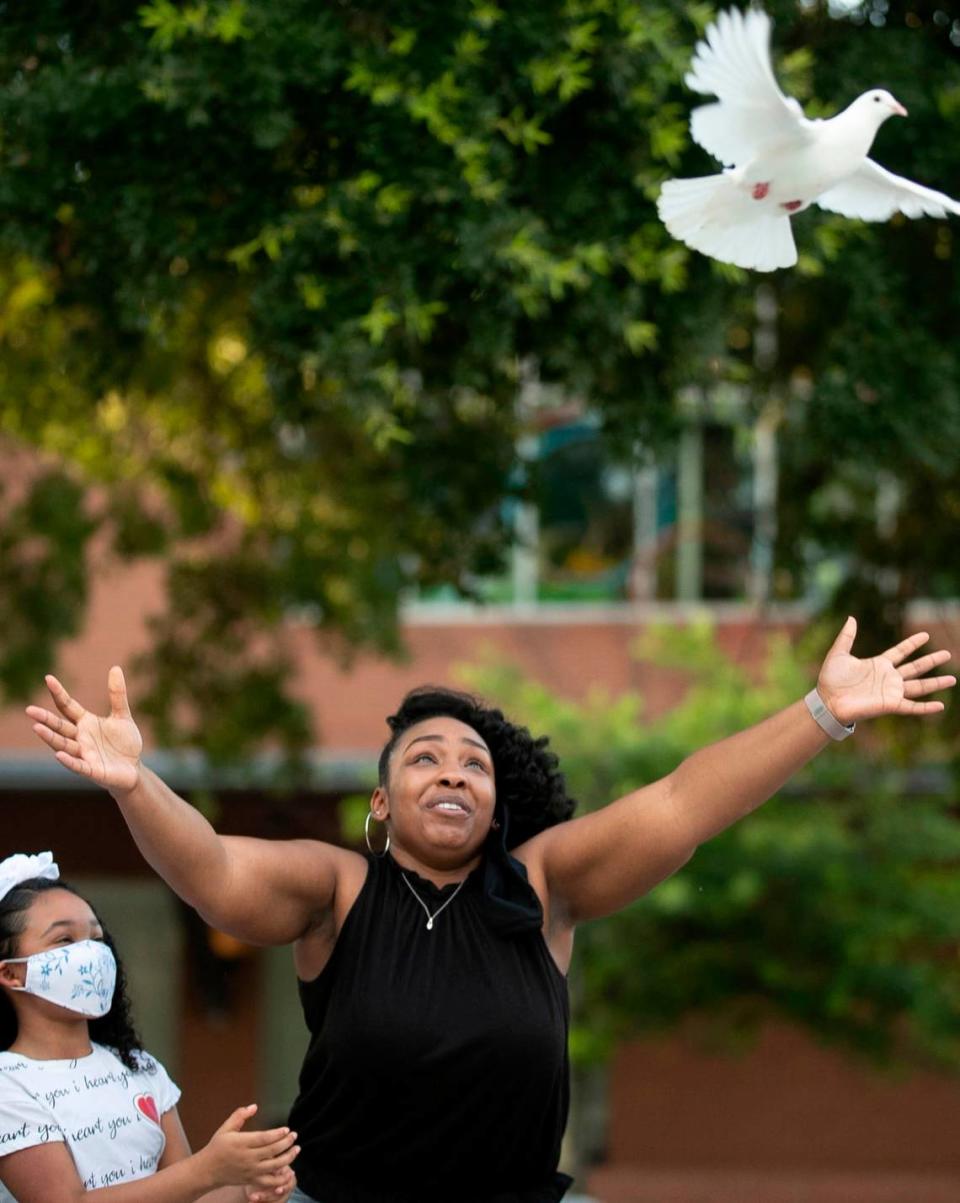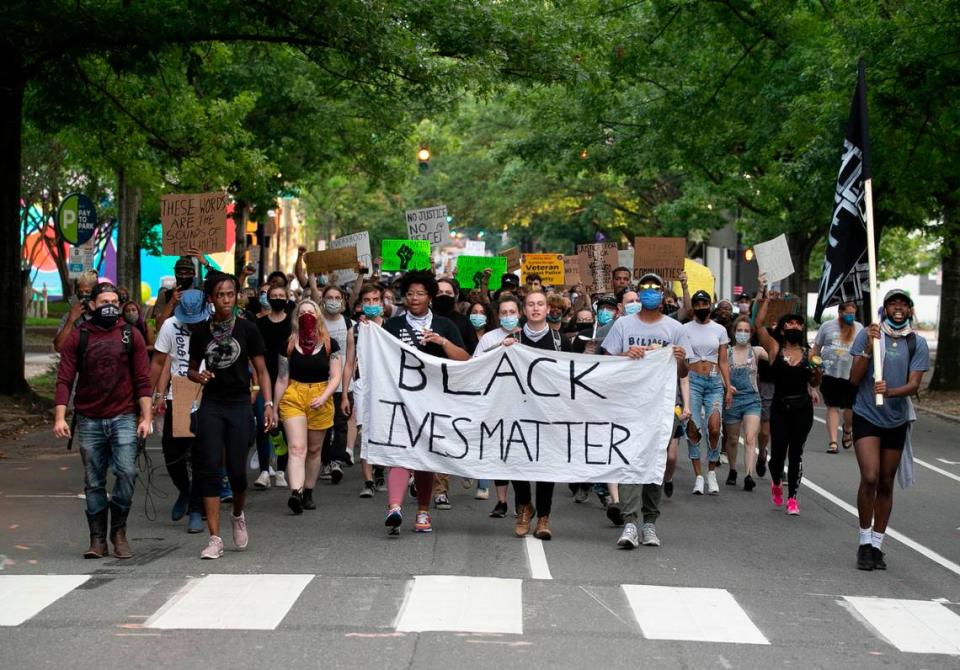Cooper creates task force on racial equity in NC justice system, reviews police policies
North Carolina Gov. Roy Cooper announced Tuesday that he has signed an executive action on racial equity to “help eliminate systemic racism in our criminal justice system.”
The executive order forms the North Carolina Task Force on Racial Equity and Criminal Justice, which Cooper said “will develop and help implement strategies and policies” that, among other things, will ensure all state law enforcement agencies have clear duty-to-intervene policies.
“That means if they see a fellow officer doing wrong, they must step in,” Cooper said.
Erik Hooks, director of the state’s Department of Public Safety, sent a letter Tuesday to law enforcement agencies about their duty-to-intervene policies. He also asked them to review their arrest procedures, the types of interactions that do and don’t require use of force, and to prioritize de-escalation.
N.C. Supreme Court Justice Anita Earls and Josh Stein, the state’s attorney general, will lead the new task force.
“For way too long, black people have not been treated equitably in the United States. We have to fix that,” Stein said. “I look forward to working closely with co-chair Justice Anita Earls and the full task force to making North Carolina a safe place for every person, no matter who you are.”
Cooper wants a report filed to him by Dec. 1.
“They will convene a wide range of stakeholders,” Cooper said, “including: community policing advocates, state and local law enforcement agencies, people who have gone through and been affected by the justice system, judicial branch representatives, people from marginalized populations and more. Their work will examine law enforcement and criminal justice practices, make concrete recommendations for how to make real improvements.”
Protesters applaud Cooper announcement
Cooper’s announcement was well received by some of the people who gathered Tuesday at Moore Square to protest. The event at Moore Square is part of the second week of protests in downtown Raleigh and across the state and nation in the wake of the death of George Floyd, an African-American man who died May 25 while in police custody in Minneapolis.
As activist Taari Coleman lit candles ahead of a vigil to recognize several people who have been killed by Raleigh police, she reminded herself that the event was also a celebration. Having spent most of the last two weeks in Raleigh protesting, Cooper’s announcement was a silver lining in a long two weeks worth of work.
“That’s what we’ve been outside of his house screaming about,” Coleman said, referring to protests outside the Executive Mansion. “We’ve been trying to get him to recognize that his people are being murdered by RPD, and most of it is racially motivated.”
Coleman said she appreciates the task force, but wants Cooper to know that he will be held accountable by the people of Raleigh and the state.
“He made the task force, so he better make sure that it works,” she said.
The Moore Square vigil was organized by the activist group N.C. B.O.R.N. (North Carolina Building Our Revolution Now) for Jaqwan Terry, Kyron Hinton, Akiel Denkins, Trindell Thomas, Soheil Mojarrad, Maurice Harden and Keith Collins, all of whom died or faced excessive force at the hands of Raleigh police.

“This is about driving for change,” said Siavash Mojarrad, the brother of Soheil Mojarrad. “This is about reminding people in power, yes, we have anger, but we have sorrow.”
Earlier that day, Soheil Mojarrad’s family filed a lawsuit against the City of Raleigh, over his death.
Other family members of those slain also released doves at Moore Square, and Coleman took a moment to praise everyone who has been out on the streets of Raleigh to demonstrate, be seen and be heard.
“It shows that what we are doing has traction,” Coleman said.
Kerwin Pittman, a member of Raleigh Demands Justice, said the task force is a step in the right direction.
“It is a great thing that Roy Cooper has created this board to tackle the racial disparities and discrimination, not only in the criminal justice system, but in local law enforcement,” Pittman told The N&O in an interview. “The beautiful thing about this board is that he’s making the officers in the state of North Carolina review their policies.”
Raleigh Demands Justice is a group of activists who have organized many protests and outlined demands for local and state law enforcement. The group has met with Cooper in recent weeks.
“I’m super excited, I’m optimistic about it as long as we get the right people at the table we can really start making a change. It feels like a big victory. It lets me know that our meeting was not in vain. He was listening to our demands and paying attention to how we felt.”

Leaving Moore Square for the governor’s mansion later Tuesday night, the protesters placed candles and a few flowers near a gated entrance, chanting, “We want justice.”
Death of George Floyd
Derek Chauvin, a Minneapolis police officer, was fired from the Minneapolis police force and has been charged with second degree murder in Floyd’s death after holding his knee on Floyd’s neck for nearly nine minutes.
Many protests have had moments of silence that last the duration of the time Floyd was pinned.
“George Floyd was not the first victim of excessive force,” Cooper said. “Too many other people of color have been harassed, harmed, injured or killed. Added together, their lives and their stories have made this spotlight too bright to ignore.
“For black people, the past several weeks have again ripped open scars created by generations of historical trauma. Too often, that trauma was inflicted by a criminal justice system that should protect them, but instead treats them unfairly.”
The Black Lives Matter movement was started several years ago.
Cooper called the death of George Floyd “a real defining moment not only for our state but the entire country.”
“I think we’ve reached a tipping point here that is positive,” he said. Cooper, who previously served as attorney general, said it is important for North Carolina to establish coalitions to make changes involving law enforcement agencies all across the state.
Stein hopes the task force will bring recommendations for meaningful change.
General Assembly legislation to expunge criminal records
The state legislature is also responding this week with proposed criminal justice change.
In the General Assembly, a bill that fizzled last year was revived in a House committee on Tuesday. The Second Chance Act would expunge some criminal records to give people a second chance. It passed through the House Rules committee on Tuesday.
Sen. Danny Britt, a Robeson County Republican who sponsored the original bill, called it a jobs bill supported by several conservative groups.
The latest version of the 2019 Senate bill would change North Carolina’s expunction laws. The bill would allow for convictions of multiple nonviolent misdemeanor convictions expunged from the records of people who committed them at 16- or 17-years-old without a waiting period. The bill would also allow district attorneys to petition the court for expunctions of dismissed charges and remove the requirement that the petitioner not have any previous felony convictions. It would also allow for the expunction of more than one misdemeanor conviction after a seven-year waiting period instead of the current law of one misdemeanor after five years and one felony after 10 years, according to the bill.
“This is a good bill that gets folks back into the job sector,” Britt said.
Tarrah Callahan of the American Conservative Union emphasized how important expungements are “for helping folks get back on track after making a mistake.”
Callahan said that especially during coronavirus, this helps people working to get back on their feet.
House Rules Chair Rep. David Lewis, a Harnett County Republican, called it “a chance to bring people together and move our state forward” in a way that addresses a systemic issue.
He noted the Second Chance Act as well as House Speaker Tim Moore establishing a new Task Force on Justice, Law Enforcement, and Community Relations.
Lewis said both are addressing “healing” in the state.
“Rules is please to be a part of taking a step toward bridging this divide and bringing forward the Second Chance Act today,” Lewis said. The latest bill version will still need to go to the House and Senate floor for votes.
For more North Carolina government and politics news, listen to the Domecast politics podcast from The News & Observer and the NC Insider. You can find it on Megaphone, Apple Podcasts, iHeartRadio, Stitcher or wherever you get your podcasts.

